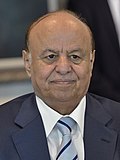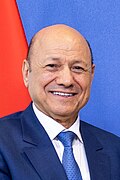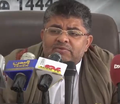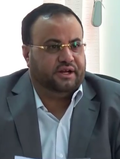| This article is part of a series on the |
| Politics of Yemen |
|---|
 |
| |
The following is a list of the heads of state of modern Yemen, from the establishment of the Kingdom of Yemen in 1918 to the present day.
Contents
- Kingdom of Yemen (1918–1970)
- Kingdom of Yemen in Exile (1962–1970)
- Yemen Arab Republic (1962–1990)
- People's Democratic Republic of Yemen (1967–1990)
- Democratic Republic of Yemen (1994)
- Republic of Yemen (post-unification, 1990–present)
- Timeline
- See also
- Notes
- References
- External links
Yemen is in a tumultuous state since the start of the Arab Spring-related Yemeni crisis in 2011; the crisis resulted in the resignation of President Ali Abdullah Saleh in 2012, after 33 years in power. [1] The presidency was then transferred to Vice President Abdrabbuh Mansour Hadi. Since 2014–2015, the country has been in a civil war (alongside the Saudi-led military intervention aimed at restoring Hadi's government after the Houthi takeover) with several proto-state entities claiming to govern Yemen: the internationally recognized Cabinet of Yemen/Presidential Leadership Council, the Houthi-led Supreme Revolutionary Committee/Supreme Political Council, and the secessionist Southern Transitional Council. [2] [3] [4] [5] [6]


























